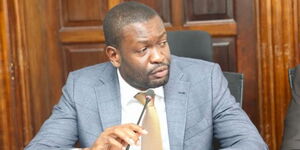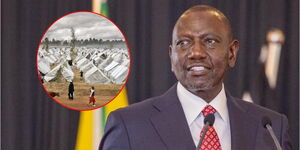More than 500 employees of the Redeemed Integrated Development Agency (RIDA) in Kenya took to the streets on Friday to protest unpaid salaries, which they claim have been delayed for four months.
The workers, who are part of a World Vision project funded by the United States Agency for International Development (USAID), say they have not received their December 2024 and January 2025 salaries, leaving many struggling to meet basic needs.
The protests highlight the growing fallout from US President Donald Trump’s decision to freeze foreign aid, which has disrupted operations at organisations reliant on American funding.
The demonstrations, held in Baba Dogo, Nairobi, saw workers accuse RIDA’s management of making false promises regarding their payments. “We were called for a meeting and promised that we would be paid despite the funding freeze, but nothing has happened,” said Mary Adhiambo, a RIDA employee.
Adhiambo, a single mother, added that the unpaid salaries have left her unable to pay her children’s school fees. Another worker, Linus Agweli, echoed her frustrations, stating that they were assured their January dues would be paid as per Trump’s order, but this has not materialised.
RIDA, which champions World Vision projects, has been severely impacted by the suspension of USAID funding. The agency’s management has denied withholding salaries intentionally, attributing the delays to directives from World Vision.
In a statement, RIDA Board Chairman Rev. Gideon Nzioki explained that the processing of transactions has been put on hold until further notice. “Our actions are in line with World Vision’s directives,” he said, referring to a memo dated January 27, 2025, which mandated the immediate suspension of all project activities.
The memo stated that only costs incurred up to January 24 would be covered, leaving workers who continued their duties until the end of the month unpaid. This has sparked outrage among employees, who feel abandoned by both their employer and the international organisations overseeing the projects.
The funding freeze, initiated by Trump’s executive order on January 20, 2025, has sent shockwaves through the global development sector. The order imposed a 90-day pause on all US foreign aid to review its alignment with American foreign policy.
While the review is ongoing, organisations dependent on USAID funding have been forced to halt operations, leading to mass layoffs and unpaid salaries.
According to Treasury Cabinet Secretary John Mbadi, Kenya will have a projected Ksh52 billion deficit in the 2024/2025 fiscal year, following the freeze in funding from USAID.
The CS told legislators earlier this month that the funding cut will affect key sectors like health, education, food security, and governance. He, however, insisted that Kenya is working to fill the gaps.












